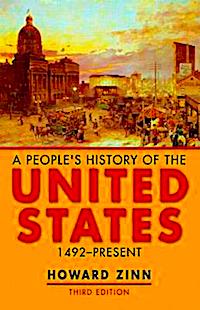

Tao Te Ching

A People's History of the United States
By Howard Zinn
Although history is said to be written by the victors, brave historical truth-tellers most-often find a way bringing the true stories of events back into cultural awareness. One of the best examples of this is Howard Zinn’s illuminating book, A People's History of the United States. Unfortunately though, the temptation for politicians to manipulate and change the historical record has frequently led to the persecution and censoring of these historical record-keepers. For the most part, Zinn escaped the kind of medieval outrage and persecution typical in the past and he was able to tell the stories of the victims of the victors. Measure the success of these efforts by the identities and allegiances of his major critics: Republican Indiana Governor Mitch Daniels tried to keep his book out of state schools, because of his support for Martin Luther King, the FBI added him to their Security Index and labeled him a high security risk, and—even as recently as 2017—an Arkansas legislator tried to ban his books from public schools.
By deconstructing the politically motivated myths of the past, Zinn hopes that learning the lessons from these mistakes can prevent their recurrence. By seeing more clearly the genocidal atrocities perpetuated by Columbus and his successors; society might generate more compassion for minorities and refugees today. By seeing more deeply into the atrocities of slavery, we might appreciate and support more freedom today. By seeing the evil of Truman and his ilk dropping both plutonium and uranium bombs on Japan in spite of their willingness to surrender for months, we might find more inspiration to stop so much militarism and weapons-making wastefulness today. By understanding the historical plight of women, we could learn to more strongly support equal rights and appreciate the important contributions of the feminine principle in the survival of our species.
By understanding history’s many examples of the extreme and dire consequences of wealth inequality, we might be less easily seduced by deceptions like “trickle down economics” and the “benefits” of reducing taxes on the most wealthy. Our view of history influences our culture, our politics, and our daily lives—economics, religion, attitudes toward race, gender, and sex—wether it be the truth or the manipulated propaganda.
Quotes from A People's History of the United States
“From 1964 to 1972, the wealthiest and most powerful nation in the history of the world made a maximum military effort, with everything short of atomic bombs, to defeat a nationalist revolutionary movement in a tiny, peasant country—and failed... 7 million tons of bombs had been dropped on Vietnam, more than twice the total bombs dropped on Europe and Asia in World War II—almost one 500-pound bomb for every human being in Vietnam... When the United States fought in Vietnam, it was organized modern technology versus organized human beings—including the greatest antiwar movement in US history—and the human beings won.”
Chapters:
Comments: Click to comment
“histories of this country... suggest that in times of crisis we must look to someone to save us... teach us that the supreme act of citizenship is to choose among saviors by going into a voting booth every 4 years to choose between two white and well-off males of inoffensive personality and orthodox opinions.”
Chapters:
Comments: Click to comment
“in that growth of American capitalism—before and after the Civil War—whites as well as blacks were in some sense becoming slaves”
Chapters:
Comments: Click to comment
“Johnson vetoed bills to help Negroes; he made it easy for Confederate states to come back into the Union without guaranteeing equal rights to blacks... made the freed slaves like serfs, still working the plantations [with] labor contracts they could not break under penalty of prison... provided that the courts could assign black children to forced labor with punishment for runaways.”
Chapters:
Comments: Click to comment
“The Civil War was one of the bloodiest in human history up to that time: 600,000 dead on both sides, in a population of 30 million—the equivalent, in the US of 1978, with a population of 250 million, of 5 million dead.”
Chapters:
Comments: Click to comment
“The cry of the poor is not always just, but if you don’t listen to it, you will never know what justice is.”
Chapters:
Comments: Click to comment
“The idea of saviors has been built into the entire culture. We have learned to look to stars, leaders, experts in every field, thus surrendering our own strength, demeaning our own ability, obliterating our own selves.”
Chapters:
Comments: Click to comment
“the United States was a democracy with certain liberties, while Germany was a dictatorship persecuting its Jewish minority, imprisoning dissidents, proclaiming the supremacy of the Nordic 'race'... However, blacks, looking at anti-Semitism in Germany, might not see their own situation int the U.S. as much different.”
Chapters:
Comments: Click to comment
“There was some truth to the standard picture of the twenties as a time of prosperity and fun... Unemployment was down, the general level of wages for workers rose. Some farmers made a lot of money... But prosperity was concentrated at the top. One tenth of 1 percent of the families at the top received as much income as 42% of the families at the bottom”
Chapters:
Comments: Click to comment
“There were millions of tons of food around, but it was not profitable to transport it, to sell it. Warehouses were full of clothing, but people could not afford it. There were lots of houses, but they stayed empty because people couldn't pay the rent, had been evicted, and now lived in shacks in quickly formed 'Hooversvilles' built on garbage dumps.”
Chapters:
Comments: Click to comment
“When Kennedy took office in early 1961, he continued the policies of Truman and Eisenhower in SE Asia. Almost immediately, he approved a secret plan for various military actions in Vietnam and Laos.”
Chapters:
Comments: Click to comment
Comments (0)